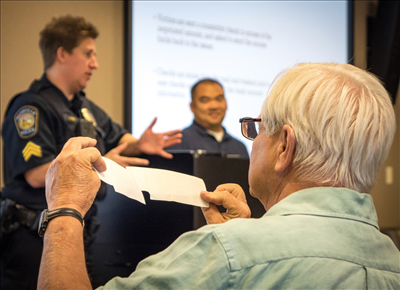
Affinity Plus, Roseville Police Department share tips to prevent identity theft, fraud during July 27 Roseville seminar
ST. PAUL, Minn. (July 28, 2017) – Sometimes, you just can’t be Minnesota Nice, not when financial scammers are involved.
About 50 participants learned that Thursday during a financial-fraud seminar hosted by Affinity Plus Federal Credit Union and the Roseville Police Department. It takes common sense, education and vigilance to help prevent financial fraud and personal-identity theft, officials said, but also knowing how to stop scammers cold.
“How to fight fraud? End the call. If somebody calls you and they sound scammy, hang up. Protect yourself. It’s not rude,” said Jen Fox, director of Consumer Outreach and Community Relations for the Minnesota Department of Commerce. Affinity Plus invited the department to speak about resources available to all Minnesotans if they are fraud victims.
Fox noted that older adults are targeted for financial exploitation at much-higher rates than other adults in Minnesota “and the threat of financial fraud is expected to grow in Minnesota.”
Roseville Police Department Detective Dennis Kim said seniors are targeted “because they have a large nest egg saved up and plans that are accessible.”
MANY TYPES OF SCAMS
Kim and Sgt. Jen Engh shared several of the most-prevalent financial scams happening throughout the Twin Cities metropolitan area and beyond, and ways to combat them.
Phone scams come in many varieties, they said, but several focus on warning that you are under threat of arrest by the Internal Revenue Service or local police unless you immediately pay back taxes or fines.
“The IRS will not contact you by phone. When you get one of these calls, it will sound very official. They’ll give you a badge number. They’ll say there’s a warrant for your arrest unless you do this immediately. Your caller ID might say something like Washington D.C. or IRS. Hang up on those. Those are fraud,” Engh said.
Another common phone scam is notification that you’ve won some sort of prize, and the caller asks that you wire the tax.
“One of the first things that should tip you off is that you probably never entered the [contest] in the first place. That should be a red flag,” Kim said.
Grandparent scams attempt to trick seniors by having the caller pretend to be younger family in need of help. The scammers are sophisticated in that they may know the grandchild’s name, or have surprisingly specific (but false) details, Engh said.
“The grandson is in Canada fishing, and he was arrested for fishing in tribal waters, and he needs money for an attorney. These are scam artists. They are smooth talkers. They are going to have answers for every question you ask of them,” she said.
DON’T FORGET OLD-FASHIONED THEFT
Financial fraud or identity theft also can be very old-fashioned, too.
“The Twin Cities has a lot of pickpocketing, and it’s a direct way for scammers to get your information,” Engh said. Restaurants and grocery stores are prime locations for thieves to distract you from your purse in a shopping cart or slung over a chair.
Engh urged participants to know what’s in their purses or wallets, encouraging them to remove credit cards or items they don’t use regularly. In addition, people should photocopy the fronts and backs of frequently used cards. If theft occurs, they will have account information and 800 numbers at the ready.
They also warned participants to no longer use the time-honored tradition of raising the red flag on the side of their home mail boxes, indicating the mail carrier should pick up letters or bills. Scammers and thieves see that as an open invitation.
“That’s called red flagging. They know something good is in that mailbox. So they’re going to swoop down the neighborhood and they’re going to hit every mailbox,” Engh said.
The scammers will “wash” the check with common household chemicals to wipe the hand-written ink off checks, then deposit or cash the checks with their own names and dollar amounts.
TALK TO OTHERS ABOUT SCAM ATTEMPTS
Kim, Engh and Fox all encouraged participants to not isolate themselves, even though scammers might insist they tell no one. Contact friends, family, law enforcement, their financial institutions or other officials when they believe someone is trying to defraud them.
“Call somebody and talk about it. Or call the Department of Commerce and report it. We can’t stop fraud that we don’t know about. Report fraud so that others don’t become victim to it,” Fox said.
The Minnesota Department of Commerce’s Consumer Services Center can be reached at (651) 539-1600.
At the end of the day, vigilance is the most-important step to take, Kim said. “Just be very wary that there’s always people who are willing to try whatever they can to separate you from your money.”
ABOUT AFFINITY PLUS
Affinity Plus Federal Credit Union is a not-for-profit, financial cooperative that puts people first above profits. Members of Affinity Plus receive maximum value through competitive rates, minimal fees, and unique, member-centric products and programs. Established in 1930 and based in St. Paul, Minn., Affinity Plus has 28 branches throughout the state and is owned by more than 185,000 members. Affinity Plus has over $1.9 billion in assets and $3.5 billion in assets under management. Additional information is available at affinityplus.org or by calling (800) 322-7228.
PHOTO - A participant in a financial-fraud seminar Thursday, July 27, at Affinity Plus’ Roseville, Minn., branch looks at checks that have been chemically “washed” of their ink by scammers. In the background, Sgt. Jen Engh, left, and Detective Dennis Kim of the Roseville Police Department describe ways to protect yourself from such scams. Affinity Plus and the Roseville Police Department partnered to hold the seminar for credit-union members and community residents.